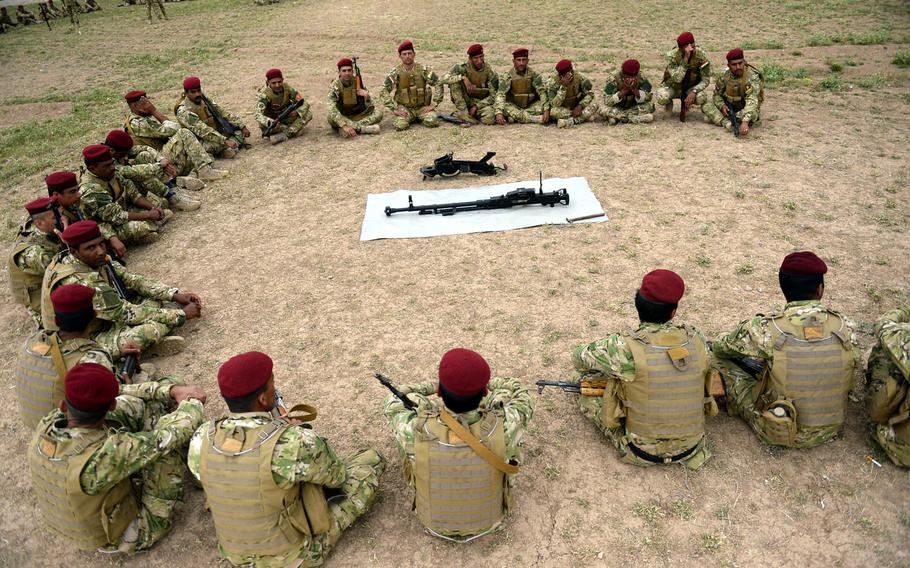
Volunteers in the fight against the Islamic State group listen to an instructor at a training camp in northern Iraq. The camp's commander says more than 5,000 fighters have been trained so far. (Josh Smith/Stars and Stripes)
WASHINGTON — The Army chief of staff said Thursday the United States must respect the Iraqi government’s decisions on deploying thousands of its U.S.-trained troops, even if those forces are not sent to key battlegrounds such as Ramadi.
Gen. Ray Odierno said many of the 7,000 Iraqis trained in recent months are guarding Baghdad while the country’s other security forces and Shiite militias are locked in a brutal struggle with the Islamic State in Anbar province to the west of the Iraqi capital.
The Obama administration and the Pentagon have confirmed that none of the troops trained since late last year were fighting in Ramadi, capital of Anbar province, when Iraqi units fled the city this month in the face of an assault by a much smaller Islamic State force.
“We have to respect their sovereignty and their decision-making on that,” Odierno said. “I think they’ve used a lot of what we’ve given them to protect Baghdad. I think that is important to them. That is the capital, so I understand that decision.”
The Iraqi defeat in Ramadi has raised questions about the effectiveness of the U.S. training effort as well as whether the Iraqi military has the will to fight.
Between 3,000 and 4,000 Iraqi troops are in line to complete U.S.-led training, and on Thursday, Defense Secretary Ash Carter said he is considering ways to improve and expedite the effort.
Odierno, who served multiple tours in Iraq and commanded all U.S. troops there from 2008 until 2010, said the Iraqi government must eventually deploy the U.S.-trained troops to other areas of the country for offensives against the Islamic State, which seized vast swaths of territory last year and gained momentum this month with the Ramadi victory.
“There comes a time when you need the capability to start expanding out,” he said. “I think over time as we train more they will do that.”
But the new effort to build up the Iraqi forces -- a key piece of President Barack Obama’s war strategy -- could take years to gain traction.
“We said early on that is going to take 3-5 years and everybody seems to have forgotten that statement,” Odierno said. “They expect things to happen quickly. It takes a while to train people in the capacity they need to retake the ground that they have lost.”
In the meantime, the U.S. is relying heavily on a coalition air campaign to reverse the recent setbacks in war and aircraft delivered 20 strikes in Iraq on Wednesday and Thursday, according to Combined Joint Task Force – Operation Inherent Resolve. The administration also announced it will expedite a shipment of 2,000 AT-4 anti-tank rockets, in hopes Iraqi security forces can take out suicide bombers in vehicles and heavy equipment.
But the Islamic State has weathered 10 months of the strikes, remaining in control of key territory and mounting complex offensives.
The group took Ramadi with an onslaught of the massive suicide bombs after 18 months of fighting with Iraqi security forces, putting most of Anbar under the group’s control.
A joint ground force of Iraqi troops, Iran-backed Shiite militias and pro-government Sunnis began a counter offensive in Anbar this week and were slammed with another wave of suicide bombings.